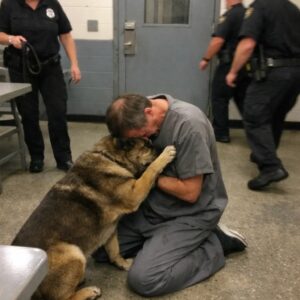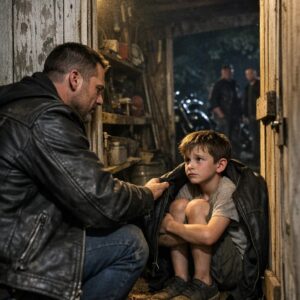My name is Judith Morrison. I’m seventy-two years old, and this is my story.
The phone rang at 8:30 on a Tuesday night. I was rinsing my dinner plate, the kitchen window showing my reflection against the dark outside. I live alone in a two-bedroom house on Riverside Drive, in a town most people have never heard of. The phone sat on the counter, the screen lighting up with an unknown number. Something in my chest tightened before I even answered.
“Hello?”
“Grandma?” The voice was small, trembling. My hand gripped the counter.
“Liam?”
“Grandma, I’m so hungry,” he was whispering, as if someone might hear. “Mom won’t wake up, and he locked me in my room. Please, come get me. Please.”
A sound in the background—a car door slamming shut. “I have to go.” The line went dead.
I stood there, phone pressed to my ear, listening to the crushing silence. My hands had started to shake. I pulled the phone away, looked at the number, and pressed call. It rang four times and went to a generic voicemail. I tried again. Same thing. Then I called my daughter-in-law, Rachel. Straight to her chirpy, fake voicemail. “Hey, this is Rachel! Leave a message!”
I hung up and called again. And again. Five times. Each one ending with that same bright, recorded voice while my grandson was somewhere locked in a room, hungry and scared.
I grabbed my keys, my coat, my purse. My phone kept ringing Rachel’s number as I backed out of the driveway, as I turned onto the main road heading east. It was a forty-five-minute drive through dark, empty roads. I’d made this drive before, but never like this, never with my hands shaking and my phone in the cup holder, trying Rachel’s number over and over.
Four years ago, my son Danny died on Route 60, three miles from his house. A truck ran a red light. He was thirty-two. Liam was three. My husband, Walter, held it together for the funeral, but three weeks later, I found him in the garage, slumped over the workbench. A massive heart attack. The doctor said grief can do that. I buried my husband five weeks after I buried my son.
Rachel and I clung to each other after that. We were a broken little family of three. Then, two years ago, she met Derek. He seemed fine at first, polite enough. He worked in construction, made decent money. Rachel smiled more when she talked about him. I wanted her to be happy.
The visits started spacing out. Every week became every other, then once a month. Then she called to say they were moving. Derek had a better opportunity an hour away. The last time I saw Liam was six months ago. Rachel had finally agreed to bring him for Sunday dinner. He was too thin. His shirt hung off his shoulders, and he barely touched his food. When Rachel went to the bathroom, I pulled an old cell phone from my junk drawer.
“Listen to me, sweetheart,” I whispered, kneeling next to him in the hallway. “I’m going to put this in your backpack. If you ever need me, if you’re ever scared, you call this number.” I showed him the contact labeled Grandma. “Nobody needs to know. Can you do that for me?”
He nodded, his eyes wide. Something in them made my stomach hurt.
“Do you need help now?” I whispered.
He glanced toward the bathroom and shook his head. When they left, I hugged Liam and felt his ribs through his shirt. I called Rachel every week after that. Most times, she didn’t answer. When she did, she said everything was fine. I was worrying too much. Soon, she’d say, soon I could visit. I stopped calling after a while. I didn’t know what else to do. Until tonight.
I turned onto Pine Street and slowed, checking house numbers. Theirs was at the end, a small rental with peeling paint and a yard full of weeds. The house was dark, except for one window glowing a dim yellow. I parked on the street and walked up the cracked driveway. I pressed the doorbell. Nobody came. I knocked. “Rachel! It’s Judith! Open the door!” Nothing.
I walked around to the side of the house. The kitchen window was head-high, curtains open. I could see the sink piled with dishes, a trash bag overflowing. I went back to the front yard and picked up a decorative rock from the flowerbed, smooth and heavy in my hand. Then I walked to the kitchen window and swung.
The glass broke with a sound that seemed to shatter the night’s silence. I used the rock to clear the bottom edge, then grabbed the window frame and pulled myself up. A piece of glass caught my palm, and I felt it slice, warm blood running down my wrist, but I didn’t stop. I shoved myself through, landing hard on the linoleum floor.
The smell hit me first: stale alcohol, old garbage, and something sour I couldn’t place. The living room was worse. Empty beer bottles covered the coffee table, and an ashtray overflowed. Rachel was on the couch, lying on her side, one arm hanging off the edge. Her mouth was open. I could smell the alcohol from where I stood.
“Rachel.” My voice came out harder than I meant. “Rachel, wake up.”
She didn’t move. I shook her shoulder. Her head lolled, but her eyes stayed closed. I put my fingers to her neck and felt a pulse. Slow, but there.
Then I heard it. A small sound from upstairs. Crying.
I moved fast, taking the stairs two at a time, blood from my hand smearing the railing. The hallway was dark. Three doors—two open, one closed. The crying came from behind the closed one. There was a lock on the outside, a sliding bolt, the kind you’d put on a shed. My hands were shaking so hard I could barely grip it. The blood made it slippery. I wiped my palm on my coat and tried again, sliding the bolt back with a sharp, metallic scrape.
I pushed the door open. The room was small and bare. A mattress on the floor with a thin blanket. The window had been painted shut. And there, on the mattress, was Liam.
He looked up at me with eyes too big for his face. His cheeks were hollow. His hair hung greasy and too long. In his hand, he clutched a navy-blue baseball cap, faded with a familiar logo. Danny’s cap from high school.
“Grandma,” he whispered. “You came.”
I dropped to my knees beside him. He fell into my arms, and I felt how light he was, how I could feel every bone in his back, how his whole body was shaking. “I’ve got you,” I said into his hair. “I’ve got you now.”
He was so thin. Dark circles ringed his eyes like bruises. On the outside of the door, that bolt lock, shiny and new against the old wood.
“Tell me what’s been happening,” I said softly.
He pulled back, his eyes red. “Derek locks me in here every night. When he gets home, he puts me in and locks the door.”
“Every night?”
“Yeah. And he doesn’t let me out until morning. Sometimes he brings crackers or a sandwich first. Sometimes he forgets.” His voice got smaller. “When he forgets, my stomach hurts real bad.”
“What about your mom?”
“She sleeps all the time. She doesn’t wake up when I yell for her.” He looked down at the baseball cap. “Derek said I can’t go to school anymore because I talk too much and the teachers ask questions.”
I felt something cold and hard settle in my chest. “You were brave to call me tonight.”
“I was really scared. I heard Derek’s truck, and I had to hide the phone super fast.” He touched the baseball cap. “I held this and thought about Dad. I thought maybe you’d come if I told you.”
“I’m here now, and I’m taking you with me.”
“What if Derek says no?”
I stood up, keeping him on my hip. My back protested, but I didn’t care. “He doesn’t get a say.”
We made it to the hallway when I heard the front door bang open downstairs. “What the hell?” a man’s voice, slurred and angry. “Who broke my damn window?”
Derek. I kept walking toward the stairs, Liam’s arms tightening around my neck. Derek appeared at the bottom, swaying. He was a big man, over six feet, with a gut hanging over his belt. He looked up and saw us.
“Judith?” He grabbed the railing. “What are you doing in my house?”
I came down the stairs slowly, my cut palm leaving bloody smears on the white paint. “I’m taking him with me.”
“The hell you are.” He started up toward us. “You broke into my house. I’m calling the cops.”
“Good,” I said, stepping past him. “I already am.” I walked into the living room, pulled my phone from my coat pocket, and dialed 911, putting it on speaker.
“911, what’s your emergency?”
“My name is Judith Morrison. I’m at 247 Pine Street. I need police and an ambulance. My grandson has been locked in a room and starved. His mother is unconscious.”
Derek’s face went white, then red. “You can’t—”
“There’s also an intoxicated man here threatening me.”
“Ma’am, are you in immediate danger?”
“Not if he stays back.”
“Units are on the way. Stay on the line.”
Derek slumped into the recliner. “This is my house,” he muttered. Liam buried his face in my neck. The sirens came fast.
Two officers came through the broken kitchen window. “I’m Officer Harper,” said the woman, her sharp eyes scanning everything. “Who called?”
“I did.” I told her everything: the phone call, breaking the window, finding Liam locked in the room. While I talked, the other officer, Parker, went upstairs. I heard his radio crackle. “Harper, you need to see this.”
Officer Harper went up and came back two minutes later, her jaw tight. “Mr. Vaughn, turn around. Hands behind your back.”
“What? I didn’t—”
“You’re under arrest for child endangerment.”
Paramedics arrived and checked on Rachel, then on Liam. “He needs to go to the hospital right away,” one of them said.
“I’m following you,” Officer Harper told me. “I’m starting emergency protective custody paperwork. Liam stays with you tonight. Probably longer. You did the right thing, Mrs. Morrison.”
In the ambulance, Liam sat on my lap. “Are we going to your house after?”
“Yes.”
“Can I stay there for real?”
I looked down at this boy who was nothing but bones and fear and a hope so fragile it hurt to see. “You’re safe now. I’ve got you, and I’m not letting go.”
He leaned his head against my chest and closed his eyes as the ambulance pulled away, sirens starting, and I held my grandson and watched the house on Pine Street disappear.
At the hospital, a young doctor with tired eyes examined Liam. “He weighs thirty-eight pounds,” she told me in the hallway. “A healthy seven-year-old should be between fifty and fifty-five. He’s malnourished, dehydrated, and I found bruises on his arms and back in various stages of healing. This didn’t happen overnight. I’m required to file a report with child services.”
“Good,” I said.
A woman in a gray suit, Karen Hughes from Child Protective Services, arrived an hour later. She asked questions in a voice that had heard too many bad stories. “Why didn’t you report sooner?”
That one landed like a punch. “I tried,” I said. “I called. They moved and cut me off. I didn’t know how bad it was.”
Karen wrote something down. “The doctor’s report is clear. I’m granting emergency temporary custody. Liam goes home with you when he’s discharged. There’ll be a hearing in two weeks, then a full hearing in six months for permanent placement. You’ll need a lawyer.”
They released Liam at dawn. I carried him inside my house and tucked him into the guest room bed. He didn’t wake up. Downstairs, I made coffee and sat at the kitchen table as the sun came up, my bandaged hand throbbing. I thought about Danny, about Walter, about all the ways I’d lost people, and how close I’d come to losing Liam, too.
I called a lawyer that afternoon. Patricia Dunn was in her fifties with eyes that didn’t miss anything. “You’ll need documentation,” she said. “Medical records, police reports, and financial records showing misuse of his survivor benefits.”
Liam received $1,250 a month from his father’s Social Security. A week later, Patricia called. “You need to see these.” The bank records showed the money going to liquor stores, bars, a tattoo parlor, and cash withdrawals at casinos. Almost nothing at grocery stores.
“They used a dead man’s Social Security benefits to pay for Derek’s truck,” Patricia said, tapping one line.
Two weeks later, I walked into the courthouse. Rachel sat at a table with Derek and a young man in a cheap suit. Judge Harriet Powell, a woman with silver hair and reading glasses, reviewed the file.
“This is a hearing for temporary custody of Liam Morrison,” she announced.
Patricia stood. “Your honor, we are petitioning for custody on the grounds of severe neglect and child endangerment.”
The public defender stood. “Your honor, my clients admit they had a difficult period, but this is an overreaction by a grandmother who—”
“I’ve read the medical report,” Judge Powell said, cutting him off. “The child weighed thirty-eight pounds. That’s not a difficult period. That’s neglect.” She flipped through the pages, her jaw tightening. “I’m granting temporary custody to Judith Morrison for six months pending a full custody hearing. Rachel Morrison will be allowed supervised visitation only, contingent on passing alcohol screening. Derek Vaughn is barred from any contact with the child.”
Derek shoved his chair back and stormed out. Rachel was crying. Judge Powell brought down her gavel. Outside on the courthouse steps, I stood in the sun and let myself breathe. For now, I thought, is enough.
Six months changes a child. Liam gained weight, first ten pounds, then another eight. The nightmares, which came three or four times a week at first, slowly subsided. School started in September. By October, he had a friend, a boy named Marcus. Small victories.
Rachel was supposed to visit every Saturday. The first week, she didn’t show. The second, she showed up drunk. The third, she came sober. Liam sat across from her at a small table, giving one-word answers and watching the clock. After a month, he stopped asking if she was coming.
A week before the full custody hearing, Patricia called. “They hired a real lawyer. They’re going to come after your age, hard.”
The courthouse was packed. Rachel sat with Derek and a man in an expensive suit. The doctor who’d examined Liam that first night testified. She brought photos. Judge Powell looked at them, her mouth a thin line. “In your professional opinion, doctor, how long had this neglect been occurring?”
“Months. At least six, possibly longer. The malnutrition was severe.”
Rachel took the stand and cried. “It was the worst time of my life. I was grieving. I made mistakes.”
Patricia stood for cross-examination. “You testified you were sick. Is that why your blood alcohol level was .23 when the paramedics tested you?”
Rachel’s face went red. “I had been drinking earlier…”
“What about the lock on the outside of your son’s bedroom door?”
“Derek put that there. I didn’t know.”
“You didn’t know your son was being locked in his room every night?”
Judge Powell’s expression was grim. When she came back from a recess, the courtroom went silent. “I’ve been on this bench for thirty years,” she said. “Age is not a barrier to custody when the alternative is a child suffering. Liam Morrison has thrived in his grandmother’s care. Full permanent custody is granted to Judith Morrison.” She brought down her gavel.
I sat very still. Outside, Liam was waiting with his therapist. He looked up when he saw me. “What happened?”
I knelt down in front of him. “You’re staying with me. For good.”
“Really?”
“Really.”
He threw his arms around my neck and held on. I closed my eyes and held him back. For good.
Three years after that phone call in the dark, I made pot roast for dinner and set the table for three. Rachel arrived at six, carrying flowers. She had completed a ninety-day treatment program, divorced Derek, and was living in a sober house. For a year, she attended every supervised visit. Slowly, carefully, she and Liam were building something new.
Liam, now ten, let her in. We sat down to eat, a photo of Danny on the mantle behind us. Rachel talked about her job at a grocery store. Liam showed her a school project about family trees. He’d included both of us, branches growing in different directions but connected.
After dinner, Rachel and I cleared the table. “Thank you,” she said quietly, “for not giving up on him. On us.”
I put the dishes in the sink. “This is what family does. We find our way back.”
She nodded, wiping her eyes. Outside, the sun was setting. A neighbor walked their dog past the house. Normal, quiet. We weren’t healed, not completely. Maybe we never would be. But we were together, and we were trying. And that was enough.





